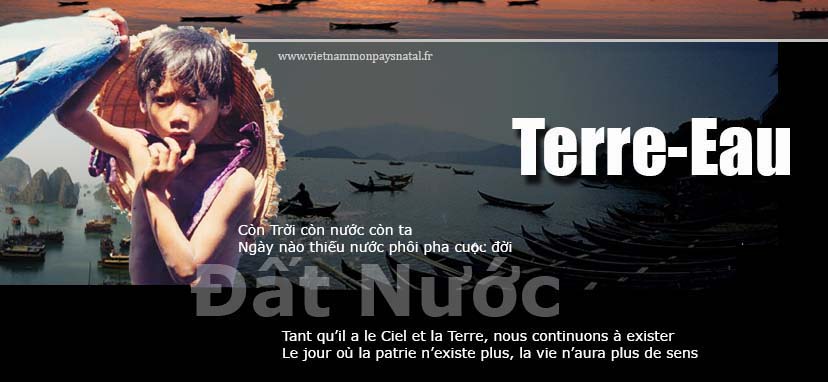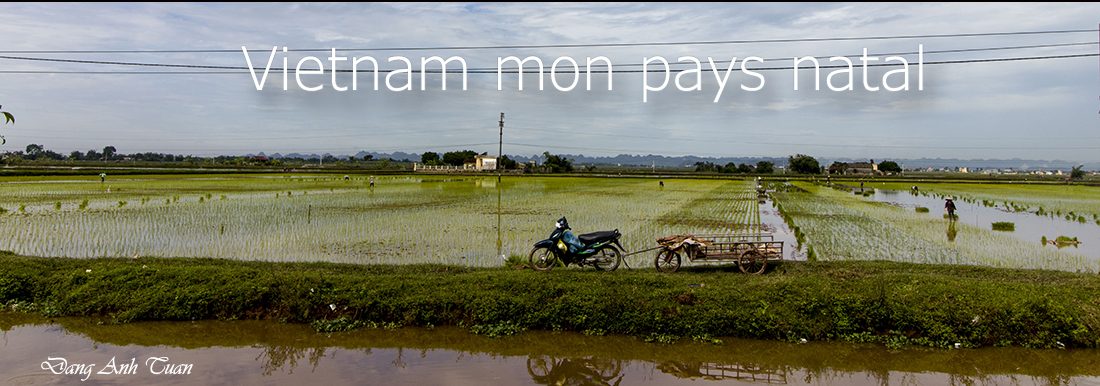French and Vietnamese versions

As long as we have the Sky and the Earth, we continue to exist.
But the day where the fatherland no more exists, our life will have no sense
Water is omnipresent in Vietnam. Water is such in osmosis with the soil and perhaps because of that the two words Ðất-Nước (Soil-Water) are often used to indicate this country. It is also here that we firmly believe we are the descendants of the Dragon king, Lạc Long Quân, coming from the Waters, and of the fairy Âu Cơ of terrestrial origin. We can say it is here that water and land unite to give birth to a people. It is also here that are found in ancient tombs amulets bearing iconographic representation of the Dragon, a mythical animal with a pig’s head and a snake’s body, a hyphen between Land and Water because the pig indicates the wealth of peasants, symbol of the Land and the snake is related to the Water.
Đất Nước
The history of Vietnam is also simply that of water. Water may become fatal because it can leave its bed to absorb harvests and whole villages. To attenuate his anger and his aggressiveness, one does not cease building dams, clogging breaches, raising ramparts, digging channels. It is it that has kneaded the thick identity of the Vietnamese people and forged this heart. It is also nourishing because it is it which fertilizes the soil and makes rice grow. But it is it which is accomplice of the Vietnamese people many times in overcoming foreign aggressors. Here, water has a thousand faces, as well as many colors and odors: tumultuous and unpredictable in the Red River with alluvium in brick color, marine and turquoise along the coasts in particular at Cà Ná, calm in Nha Trang, unchained and hemmed large waves with Ðà Nẵng, stagnated with an amber color in rice paddies and dying between the roots of palm trees in the arroyos of the Mekong Delta.
This water is found everywhere even in remote corners of Vietnam. After some monsoons, a basin left outside, a broken earthenware jar, a ditch at the edge of the road may hold it and thus become an aquarium for a biology laboratory, a water fragment for the breeding of the tadpoles or a mini-pond where lotus flowers bloom. It is also at the entrance of the villages that one finds stagnant water in ponds, covered again with water lentils and water weeds, companions of the pauper’s bowl of rice.
Water is also synonymous with fatherland. That is why the last emperor Duy Tân, brought to the throne at the age of 8 and later exiled by colonial authorities used this signification to reveal his state of mind. One day, coming back from a walk at the sea, his hands were so dirty that an old servant asked him to wash them in a basin filled with water.
The emperor asked him the following question: If the hands are dirty they can be washed with water. But if the water is « soiled », what can we clean it with? Emperor Duy Tân wanted to say if the fatherland is « humiliated », with what it could be washed off this outrage?.
This reflection stunned the old servant and made him shake.
Without waiting for his answer, the impassive emperor Duy Tân responded in his stead:
If the water is « soiled », one will wash it with blood.
If by essence, water is a protecting, fetal and vital element for humans, it is even more so for the majority of Vietnamese, a raison-d’être in this world, as it is synonymous with the word « Fatherland ».
